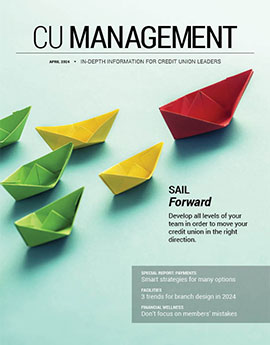3 minutes
Remove day-to-day contacts, take a programmatic approach and beware the ‘no hassle’ renewal.
Credit unions are more reliant than ever on vendors and third-party technology providers to keep pace with the continuously evolving digital landscape and to provide the state-of-the-art experiences that members expect.
A natural synergy exists between fintech firms and financial institutions. Fintech is well-equipped to design and deliver solutions rapidly, often at a lower cost than in-house development. With the current inflationary environment, credit unions are exploring all possible avenues to control costs, especially given labor expense trends.
While the time is right for credit unions and fintechs to work together, there are important areas that must be navigated before arriving at a successful partnership, with one of the biggest centered on contract negotiation and optimization. Whether dealing with an existing vendor or coming to terms with a new provider, an inevitable power imbalance looms over the negotiation process as millions of dollars are usually at stake when negotiating a credit union’s portfolio of vendor agreements. Certain rules should be followed to ensure the working relationship is secured or preserved and a disciplined approach is followed.
Take Regular Contacts Out of the Equation
It all starts with the working relationship between the vendor and the client. These ongoing connections are usually centered on a few key contacts within each party, who often develop friendships over time that can be valuable in cutting through bureaucracy and getting things done during moments of truth.
However, this level of familiarity can be counterproductive during a contract negotiation, where the environment can become tense. To preserve the relationship, day-to-day contact should be removed from the decision-making process. Clearly their domain expertise provides important input, but objectivity is also critical to vendor selection and contracting. Limiting the role of the primary point of operational contact at the negotiating table should prevent personal feelings from unduly influencing the exercise.
In addition, some vendors may try to enlist a sympathetic FI employee as an ally/advocate during the negotiation. Such an individual’s voice is important but should not be allowed to dominate the proceedings.
Take a Programmatic Approach to Negotiation
While limiting emotions is a step in the right direction, a programmatic approach is necessary for the effective management of financial technology contracts. It’s helpful for financial institutions to assign a project lead—most likely the CFO, controller or, in larger organizations, a delegate from the finance department—as the point person for each agreement. This is not to minimize the procurement department's role. It is an acknowledgment that these types of contracts require specialized knowledge to supplement traditional procurement skill sets. Important perspectives and input exist throughout the organization, spanning customer support, IT, compliance and other functions. The project lead should set clear priorities for the relationship and the negotiation process, as well as develop a framework for successful ongoing operations.
Beware the “No Hassle” Renewal, Even With Valued Partners
In addition to eliminating emotions and personal relationships, an important and straightforward lesson to keep in mind is that credit unions should never routinely renew or extend an agreement solely because they’re satisfied with the relationship.
Vendor reps have been known to reach out to their clients with “short-and-sweet” contracts to execute “no hassle” renewals, often well before the stated renewal date. This can be tempting when things are going smoothly. You think, “Why not check it off the to-do list and avoid diverting valuable resources into a negotiation you plan to renew anyway?” If a vendor approaches a credit union with an offer to extend at current contract terms in this manner, it’s an almost certain sign that money is being left on the table.
The contract negotiation process can be challenging and overwhelming, which is why it’s so important that credit unions bring the proper skills to the table to solve the power imbalance. These discussions set the stage for both operational and financial success and must be approached programmatically and professionally. The assignment of a cross-functional team with clearly defined roles and responsibilities is an important step in this direction.
As president of SRM (Strategic Resource Management), a CUESolutions provider based in Memphis, Patrick Goodwin is focused on strategic growth for the company, while maintaining the level of revenue enhancement and advisory excellence that clients have come to expect. Get more on these and our other rules for optimizing vendor contracts in our latest whitepaper on best practices for negotiating with vendors.








